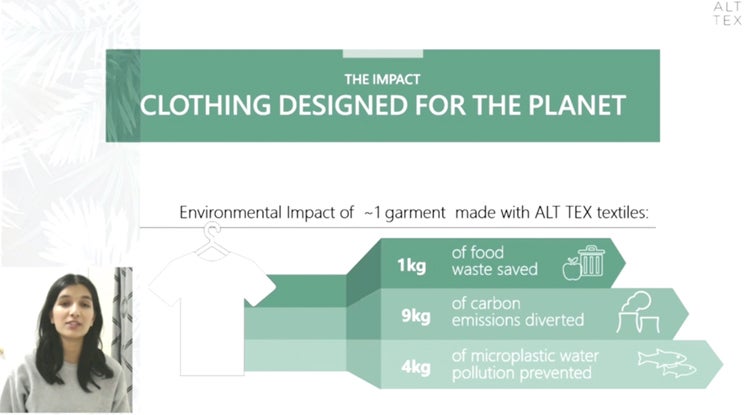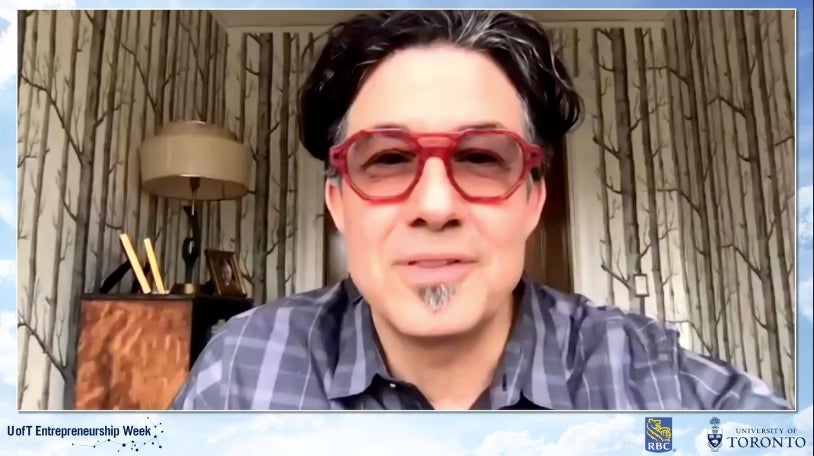‘A culture of discovery’: U of T Entrepreneurship Week spotlights innovation and inclusion
From showcasing startups and highlighting the achievements of women in business to fostering discussions on mental health, organizers of Entrepreneurship Week managed to pack a wide array events into this year’s virtual calendar.
The fifth-annual celebration of U of T’s vast entrepreneurship ecosystem, which wrapped up late last week, featured several Entrepreneurship Week mainstays, including: the RBC Prize for Innovation and Entrepreneurship pitch competition, offering $50,000 in prizes; the RBC Speaker Series, featuring biologist-entrepreneur Derrick Rossi, who co-founded biotechnology firm Moderna and laid the scientific groundwork for the company’s COVID-19 vaccine; and the True Blue Expo, which featured virtual booths from dozens of startups, U of T’s campus-linked accelerators, NGOs and government programs.
But there were also several additions to this year’s roster: the Scale-up Showcase, highlighting the stories of 10 of U of T’s fastest-growing companies; “Celebrating Leaders, Black Women in Business,” a panel discussion exploring the experiences of three Black women in the business world; and a session on mental health awareness for entrepreneurs.
In many cases, the events took advantage of the online format to offer interactive elements to increase engagement, drawing attendees from around the world.
“This year’s festival is unprecedented for obvious reasons, as we’re coming together virtually to recognize and celebrate innovation across the U of T ecosystem,” U of T President Meric Gertler said in remarks delivered before RBC Speaker Series. “And yet, as we’ve seen all week, notwithstanding these challenges, entrepreneurship activity is at an all-time high in spite of – or perhaps, because of – the pandemic.
“Many of U of T’s brightest innovators are building solutions that respond to the health and economic challenges posed by COVID-19.”
President Gertler also noted that this year marks the 100th anniversary of the discovery of insulin at U of T: “From this illustrious beginning, U of T together with our hospital and industry partners has created a culture of discovery, innovation and collaboration that has helped transform industries from health care to finance, to computing and much more.”
ALT TEX is one example of a U of T startup that’s eager to shake up the status quo.
The company, co-founded by U of T Mississauga alumna Avneet Ghotra, is seeking to transform the fashion industry by replacing polluting polyester with a biodegradable fibre made from converted food waste – an endeavour that earned the company the $25,000 top prize in the late-stage category of the RBC Prize for Innovation and Entrepreneurship. Ghotra not only impressed the panel of judges with her pitch, but also captured the imagination of the audience, which awarded ALT TEX the $4,000 Dongjun Wang Family True Blue Prize – a people’s choice award voted on by attendees.

Avneet Ghotra, an alumna of U of T Mississauga, delivers a pitch on behalf of ALT TEX, a sustainable fibres startup.
The $10,000 second-place prize in the RBC competition’s late-stage category was awarded to Revolve Surgical, whose novel platform reduces the size, cost and training time associated with surgical robots.
In the early-stage category, meanwhile, the top prize went to NerveX Neurotechnologies, which won $10,000 for a medical implant that can control the nervous system to treat canine epilepsy. The $5,000 second-place prize was awarded to Elaya, which is developing a medical device that can deliver neuromuscular electrical stimulation to treat patients with ICU-acquired weakness.
Fyyne, a startup that helps hair artists connect with customers and run their business more efficiently, took home the people’s choice award in the early-stage category.
One of the most highly anticipated events at Entrepreneurship Week this year was the RBC Speaker Series, featuring Rossi as its keynote speaker. Rossi is a U of T alumnus, former Harvard Medical School professor and serial entrepreneur who co-founded several biotechnology firms including COVID-19 vaccine-maker Moderna.

Derrick Rossi, a U of T alumnus and co-founder of COVID-19 vaccine-maker Moderna, was the keynote speaker during the RBC Speaker Series event.
In a conversation moderated by BNN Bloomberg anchor Amber Kanwar, Rossi outlined his journey as a biologist-entrepreneur, the science behind Moderna’s modified RNA technology and COVID-19 vaccine, the growth of the biotech industry and his thoughts on what the future holds for stem cell therapy and vaccine development.
He revealed that Moderna had big ambitions from the get-go, even if they revolved around applying mRNA therapeutics towards genetic diseases rather than a pandemic. After running in “stealth mode” for the first four years, Moderna filed for intellectual property rights that “imagined tackling anything and everything with mRNA therapeutics.”
“That was the type of ambition we had at Moderna,” Rossi said. “So, it doesn’t actually shock me to see that it went on to this type of bent. I always believed in mRNA therapeutics. Did I believe that the first application would be a global pandemic? No.”
Following the conversation, Rossi took questions from several U of T entrepreneurs. Seray Çiçek, co-founder and CEO of LSK Technologies – which won the top early-stage prize at last year’s RBC pitch competition – asked what it would take to be able to develop therapeutics and vaccines in advance of virus outbreaks, rather than retroactively.
“I think to really pre-empt every possible virus … that’s probably a challenge that nobody’s going to pay for, and that’s the problem,” Rossi said. “Rather, I would say that if we continue to push the technology envelope such that we have technologies that can really turn on a dime to address challenges quickly, I think that’s our best hope.”
Rossi noted that as novel technologies like mRNA-based vaccines continue to develop, the time needed to create future vaccines will shrink. He cited the flu vaccine as an example. “We don’t run vaccine trials for the influenza vaccine every year – we’ve done it so much, we’re so comfortable with the safety profile [that] you get your influenza vaccine every year without a clinical trial,” he said. “I think that that will eventually happen with these types of technologies.”
Following Rossi’s talk, it was on to the Scaleup Showcase and further inspiration and insights – this time, from the entrepreneurs behind 10 of U of T’s fastest-growing startups. Speakers included Nuha Siddiqui of plant-powered plastics startup Erthos (formerly Ecopackers); Helen Kontozopoulos of ODAIA, which developed an AI-powered customer analytics platform; and Albert Tai of Hypercare, a communication app for health-care professionals that has helped streamline care for COVID-19 patients.

